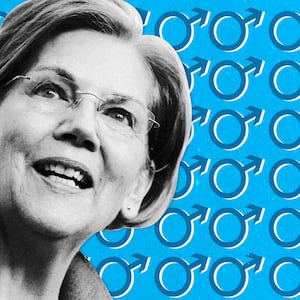Just a week before the crucial first Democratic debate, Sen. Bernie Sanders (I-VT) finds his campaign stalling. His path to winning the nomination has seemingly narrowed as he lags behind former Vice President Joe Biden in national and state polling and as Sen. Elizabeth Warren (D-MA) has overtaken him in a few surveys as well.
Sanders’ team says it recognizes that there is work to be done. But they remain confident that their small dollar fundraising operation and broad volunteer base will make a difference in the early voting states. And they are not leaving anything to chance.
As the primary hits its summer stretch, Sanders' team is gearing up a plan to differentiate him even more from the pack: hitting Biden on policy differences and challenging his presumption of electability; all while drawing the occasional, subtle, contrast with Warren, his nearest ideological competitor.
Over the past few weeks, Sanders has gone harder at the former vice president on a number of fronts, from foreign policy to trade, to the ambition of their domestic agendas. The two will share the stage in Miami next Thursday for the second night of the Democratic debates and the expectation is that the punches will come even harder, with Sanders attempting to draw Biden into a policy back-and-forth.
“Bernie Sanders out of any candidate running for president has been fearless in directly and explicitly confronting corporate power and the billionaire class,” David Sirota, speechwriter for Sanders, told The Daily Beast. “I think, ultimately, electability without concrete policy positions and a policy agenda then becomes this squishy thing that can move all over the place.”
That’s because Sanders’ team has bought into the polling data showing that the senator is listed more than any other candidate as the second favorite option for Biden supporters. To get those voters, the campaign is not just seeking to attack Biden’s voting record, but to draw a contrast in how the two have structured and funded their operations. The former vice president, who has embraced large-dollar fundraisers, has consistently stated that reaching across the aisle is one of his central strengths—though the recent blow up over his nostalgic reminiscence of working with segregationist senators may complicate that. Sanders, who has relied on small-dollar and more recently some grassroots fundraisers, has argued that a mass movement of voters will allow him to put pressure on politicians in his prospective administration.
“He’s hopeful that one of the ways to draw the contrasts with other candidates in the field is to talk about how you believe you intend to govern if you can’t build a grassroots movement,” said Faiz Shakir, Sanders’ campaign manager. “Put more directly, are you building a grassroots movement or not? And what role do you see for enlisting people in the course of policy change?”
Sanders’ team is also keen on more directly challenging the perception that Biden is the best Democrat to match up with Donald Trump—a perception that has helped propelled Biden to an early lead in the polls. In the days leading up to the debate, the Sanders campaign has cast his candidacy as the strongest against the current president, pushing a polling memo showing Sanders leading 25 of 26 head-to-head matchups with Trump since March.
“I think we still are trying to make clear that Bernie Sanders’ argument to beat Donald Trump is just as good [as Biden’s],” Shakir said, adding that the current frontrunner has tried to make it seem as though the candidates are all quite similar. He’s trying a “little bit of “we’re all shades of grey, we’re all similar. We’re all more similar than we’re different.” And I appreciate that. But over time, I think what’s going to happen is clearer contrasts are made, voters are going to have specific choices to make.”
“Right now I’m not sure that those paths have been made clear to a lot of voters,” he added.
To leapfrog Biden, however, Sanders team isn’t just pushing the electability argument and teeing up more aggressive policy contrasts, they’re also devoting campaign resources into movement-building. It’s an approach that Sirota dubbed, “show, don’t tell,” and it involves actions like attending an annual Walmart shareholders meeting to confront the owners of the company, marching into a recent Iowa Democratic Hall of Fame dinner with McDonald’s workers protesting low wages, and using the campaign’s email list to support and encourage attendance at labor protests around the country.
That tactic comes at a bit of a cost, Shakir noted, since campaign resources are not infinite. But the internal argument is that such moves showcase Sanders as a movement leader and attract voters by giving them a vision of the presidency he’d lead.
“When we send out those emails, remember, there’s a reason why other people don’t do it as much because every time you do it there’s an opportunity cost,” Shakir told The Daily Beast. “Other people would be sending out fundraising emails and we’re actually sending out emails in many cases to recruit for rallies or to recruit for people going to stand on behalf of striking workers. Any time you do that, there is opportunity cost to it.”
But as Sanders gears up to more forcefully tackle Biden, his campaign has had to wrestle with Warren’s rise in the polls. The Massachusetts Democrats represents a far more complicated opponent, in no small part because she and Sanders are more ideologically similar and consider themselves friends.
Sanders and his team have been largely reluctant to refer to her directly. But that seems to be fading a bit. On Wednesday, Sanders account put out a tweet referencing a Politico report on how some attendees at a conference for the Third Way centrist think tank had inexplicably warmed to Warren’s candidacy. The tweet came off as an attack on Warren’s anti-corporate credentials. And in an illustration of how delicate the situation is between the two, the Sanders campaign released a statement soon after explicitly going after Third Way and leaving Warren unmentioned.
"The corporate wing of the Democratic Party today declared war on Senator Sanders, even as polls show the senator is in the strongest position to defeat Donald Trump in the general election,” the statement from Shakir read. “Leading the fight against Senator Sanders is Third Way, a Washington think tank that has admitted that its major source of funding is the same reckless financial industry whose greed and illegal behavior created the Great Recession…”
Sanders has also notably declined to go after Warren during a recent “Fox News Sunday” interview, which touched on his sliding polls. And he won’t get the chance to do so during the first debates as Warren is slated to appear on the first of two nights, absent Sanders or Biden.
The reluctance to go after Warren more is owed, in part, to the belief that her voters may not necessarily jump to Sanders if he’s the one issuing the jabs. But as her status improves in the polls, the possibility of more direct confrontation increases. And some progressives have already grown dismayed that there could be an effort to pit them against each other.
“The effort to gin up a media frenzy over Bernie losing ground to Warren is really bad news,” Charles Lenchner, a founder of People for Bernie Sanders and who previously co-founded a Draft Warren effort ahead of the 2016 presidential election, said. “The vast majority of people in both camps aren't focused on converting each other, but on efforts to engage non voters and to form a common front around bold policy proposals.”
“I would be ecstatic if the nominee was Warren,” he added. “That said, in the end you can only vote once, and my vote will go for Bernie. Please don't interpret that as an 'anti-Warren' vote. The main goal is to prevent Biden or another centrist from winning the nomination.”








